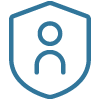May's Basecamp Newsletter


Am I Alone in My Debt?
May is Mental Health Awareness Month, so it's high time we address a common yet often unspoken concern that impacts the mental well-being of many individuals—debt. The thought, "Am I the only one struggling with debt?" frequently crosses the minds of countless people. However, the reality is far from this perception. Debt is a widespread issue, affecting a significant portion of the population, yet it's not all detrimental. Understanding the difference between growth-oriented and burdensome debt, along with strategic management, can transform your financial health and, by extension, your mental peace.
Most Americans Have Debt
Debt, in its various forms, is a shared experience among many, and consumer debt has seen a massive increase since the pandemic. In 2020, an Experian study revealed that 75% of all credit card holders reported balances greater than $0, with the average balance standing at $5,3151. Since then, consumer debt balances have increased by 10% from 2022 to 2023 to an average of $6,501.
Consumer debt as a whole saw an increase in the US in 2023, with average auto loan balances increasing by 5.2% to $23,792, and personal loan balances increasing by 6.3% to $19,402. In total, consumer debt across the board has increased by 4.4%.
Debt That Helps Vs. Debt That Hurts
Here is where it's important to distinguish the debt that helps you versus the debt that hurts you. There is debt with high interest rates, like credit cards and payday loans, that use a large portion of your budget and prevent you from being able to progress toward your financial goals. Then, there is debt that helps you grow your personal wealth and assets, like loans secured by collateral and mortgages.
Read this full blog to read more about the differences between debt that helps and hurts, taking a strategic approach to debt, and how you can think about debt going forward.

Shred Day
Join us for our free shred day on Friday, June 14th at our Lewiston Warner, Meridian, Post Falls, and Walla Walla branches!

Win a Little Adventure this Summer from P1FCU
Each time you use your P1FCU debit or credit card this summer, you're entered to win prizes to help you get out and explore this summer.
 How do scammers get information about me?
How do scammers get information about me?
More and more, scammers have been successful in their attempts to access your accounts due to the amount of personal information they have about their victims. It makes sense, the more someone knows about you, such as where you bank or live, or even names of family members, the more likely you are to trust their requests.
Scammers are able to get information about you through several sources like data breaches, social engineering, monitoring your online activity, or through phishing attempts. What does this mean for you, and how you should proceed?
Check out our blog that unpacks all of this information and outlines a few red flags below.


